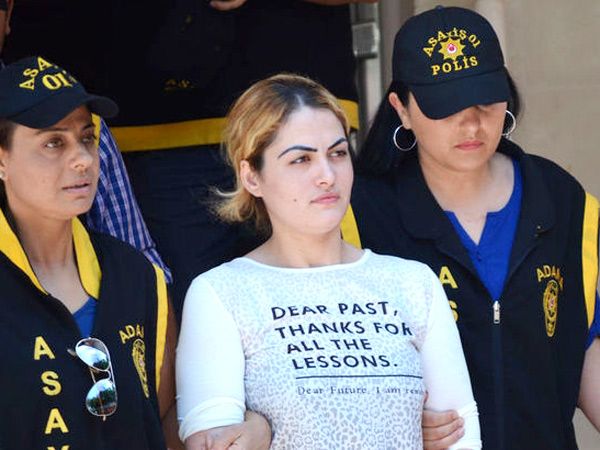
Earlier last week, international headlines exploded with news of Turkish authorities arresting a 28-year-old woman in the southeastern city of Adana. Cilem Karabulut turned herself in to the cops and admitted to killing her husband, Hasan, 33, with his handgun. However, it wasn’t just a case of cold-blooded murder. Karabulut insisted that she was defending her ‘honour;’ the husband having allegedly beaten, drugged and abused her, besides forcing her into the flesh trade.
This year, Turkey witnessed nearly 150 women being slaughtered by their own husbands, fathers or brothers, this year itself. The case of Karabulut stands out as a woman who stood up for her self defense and showed no remorse while pulling the trigger on a man, who was supposedly her protector. “It shouldn’t only be women who do all of the dying here. It’s time for men to do some dying, too,” she stated defiantly, indicating the mounting violence against women, in her corner of the world.
Miles away in another patriarchal, male-dominated nation, domestic violence also happens to be the single-largest crime against women. India. The National Crime Records Bureau (NCRB) in 2013 reported over 118,000 domestic violence instances, which summed up to a third of all crimes against women, far ahead of molestation (70,739) and rape (33,707). The number of reported domestic violence cases having increased from 50,703 in 2003 before the passage of the Domestic Violence Act of 2005.Within two years of its inception, the women’s crisis helpline 181 claimed to have received nearly 500,000 distress calls reporting domestic violence, according to a report in a leading Indian national daily held in May, 2015.
However, for every caller who reached out to report such a case, there were more who sunk into silence, afraid of social stigma. For centuries, women have been conditioned to be servile, to prepare their minds and bodies for matrimony and motherhood. It’s a state of dichotomy then-a country that worships various goddesses and yet prevents its menstruating daughters from entering a temple threshold or the kitchen, citing religion. Wouldn’t one define this as narrow, cultural conservatism, which is being strengthened by religious mumbo jumbo and archaic, misogynistic family traditions?
What’s more shocking is that according to NCRB, 98% of all rapes that occur in India, involve perpetrators who are known to the survivors, ranging from friends, acquaintances, colleagues and relatives. Sexual violence, which also covers rape, falls under the broader aspect of domestic violence, and yet there is a stifling, hypocritical purdah on rape by husbands within the arched sacred ground of marriage. And while there is general agreement that forced sex, sans a woman’s consent, tantamounts to rape, all a woman can do in such circumstances is, simply file a case under the same domestic violence act to be dealt with in a civil court, lending the wife a legal right to separate from her husband on the grounds of cruelty.
Rampant sexual violence in marriage continues to haunt many Indian marriages, arranged carefully through matrimonial sites and newspaper ads, with astrological and caste and gotra matching. With the average Indian man, viewing masculinity as a control mechanism to make the woman do as he says and wants, even in bed, her virginity is her precious gift to him. The first night build-up in popular culture, serials and advice columns in women’s magazines and Bollywood films adds a dose of grandiose to this occasion, when a woman is finally deflowered.
In the National Family Health Survey (2005-2006) conducted among 124,385 women in 29 Indian states, 10% women reported that their husbands had physically forced them to have sex. Another study led by the International Centre for Women (ICRW) and United Nations Population Fund’s (UNPFA) across seven states in India in 2014 covered 9,205 men and 3,158 women aged 18-49 from each state. One-third of the men interviewed admitted to having forced a sexual act on their wives.
In 2013, another United Nations survey disclosed that nearly a quarter of 10,000 men questioned in six Asia-Pacific countries, including India, admitted to having raped a female partner. The acceptance that they are entitled to sex sans their partner’s permission was a common motivation, the study further added. Majority of these men profiled had also experienced zero legal consequences. A shocking 2014 study by the United Nations Population Fund and the International Center for Research on Women revealed that 60% men admitted to exercising violence-kicking, beating, slapping, choking, burning-to establish dominance.
The survey also reported that only one in four abused women in India has ever sought professional help, as they are less likely to seek assistance for sexual violence than for physical violence. Also, there is a tendency amongst female family elders to ask the suffering women to shut their mouth, for fear of community ostracism. A woman’s bedroom, the darkness between her thighs, the ugly scars on her back and breasts, is then her own fate. A woman fears to return to her parent’s home and in the process, she has to compromise for the sake of her children.
It’s true that we have a long journey to overcome. It’s also true that women are coming out of the closet in India to register censorship as a birthright valid for every citizen, reclaiming their lost voices, in more ways than one. Many women and men in Turkey have taken to street protests, since the murder of Ozgecan Aslan, a university student who was killed during an attempted rape.
Our battle is not just about the state of marriage or a woman wearing a miniskirt or being able to speak her mind freely, being single woman or a single mother, working as an air-hostess or a bar dancer, we are also at war with the government and ministers, like Haribhai Parthibhai Chaudhary who made a statement in the Parliament that marriage is a ‘sacrament’ and that the concept of marital rape cannot be applied to India.
Every day, it is the men who define the boundaries of our sex and sexuality, who tell us what to do and how to do it, who follow us in dark bylanes and letch at our bare backs, who operate school buses and work in our homes, who are our bosses at work; the men who sit on judgment in village Khap Panchayats; the directors who insert sleazy item numbers to make the movies a mass consumption; the relatives who sodomize us as little girls; the ones we are married to; the man sleeping beside you, whose hands hold your wrists firmly…
The ones who murder our soul…
More On >> Balancing Act




